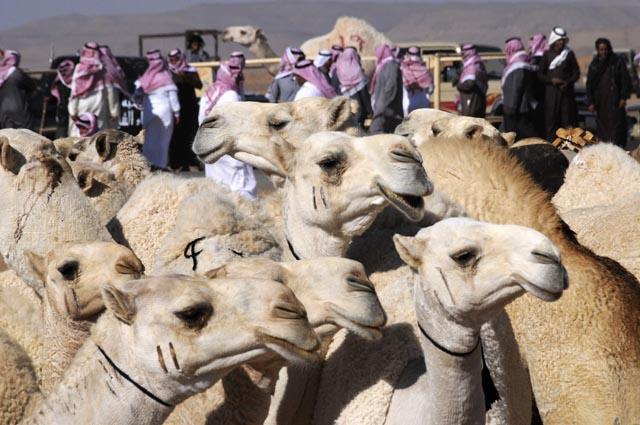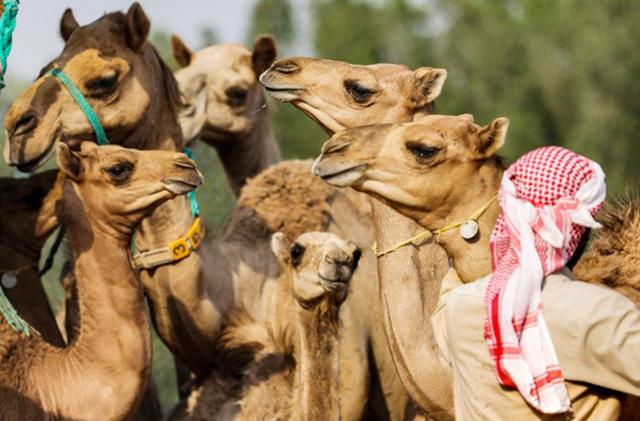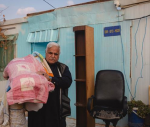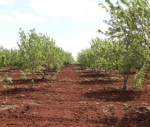You are here
Into the arena for camel wrestling in Turkey
By AFP - Jan 24,2019 - Last updated at Jan 24,2019
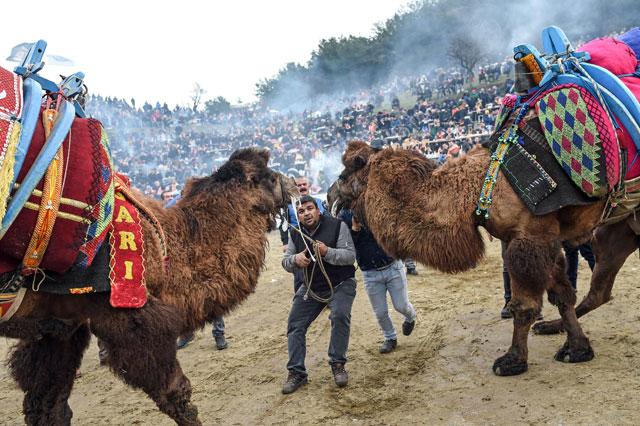
People try to push camels to fight during the contest of Selcuk Camel wrestling festival in the town of Selcuk, near the western Turkish coastal city of Izmir, on Sunday (AFP photo)
SELCUK, Turkey — Erol Bilgin has high hopes. His camel, Kara Elmas (Black Diamond), might not have won the beauty contest the day before, but it might well fare better in the main event, the wrestling competition.
The two large camels stand face to face, sizing each other up, before throwing themselves head-first at one another.
Each animal struggles to bite its adversary's feet to topple them, their long necks interlocking as the crowd cheers.
More than 2,000 people, many settled around little tables for picnics, spur on their favourite to win.
There are boos too, for those owners down in the arena who intervene too much in the matches.
The contests take place in the western Turkish town of Selcuk, at a site just a few minutes from the Aegean coast.
In the fighting arena that day, 124 camels wrestled each other in short duels — part of a centuries-old Turkish tradition.
Camel culture in Turkey dates back to the Yoruks, a nomadic people whose ancestors were the ancient warrior Selcuks, who arrived in Anatolia during the 11th century.
The first camel fight was formally organised in the region around the 1830s, says Devrim Erturk, an academic at Dokuz Eylul University in Selcuk.
As the nomads settled, the camels were used for the transport of goods, mainly towards the western ports of Turkey.
‘‘And the cameleers started to make their camels fight in the places they stopped at in the region,’’ Erturk said.
He himself owns several camels, including a two year-old male that he wants to see wrestle in the arena.
Nearly 90 such events have been organised to take place in the region from Canakkale in the northwest to Antalya in the southwest between December and March.
This is the reproductive season for camels — when the males who fight are naturally more aggressive — and a quieter period for residents, as agricultural activity slows in the winter.
Beauty contest
Animal rights groups often call for the fights to end, denouncing them as cruel.
But everyone at the arena insisted that all necessary measures are taken to protect the camels, including tying a cord around their mouth to limit the opening and biting.
‘‘For a cameleer, their camel is very precious... so the owners do all they can to ensure no harm comes to [their animal],’’ said Erturk.
‘‘Many carry the name of the cameleer's children. My father gave my name, Devrim, to one of his camels.’’
The Selcuk festival, one of the most important, is held every year on the third weekend of January.
One of those in the audience is Abdullah Altintas, who has come to watch with his wife, Nilgun.
‘‘My father and grandfather had camels, it's an ancestral tradition. Alas, I don't have any but I go to see all the duels,’’ he told AFP.
Related Articles
The 40-odd men gathered in a sandy, dung-scattered auction pen at one of Saudi Arabia’s largest camel markets were fiercely dismissive of a link scientists have found between the animals and an often fatal virus in humans.
DUBAI — Cloning is in high demand in the competitive world of camel beauty pageants, leaving scientists at a Dubai clinic working round the
AMMAN — Breeders face several obstacles in growing the camel industry, including drought spells and a lack of promotion in local markets, th


